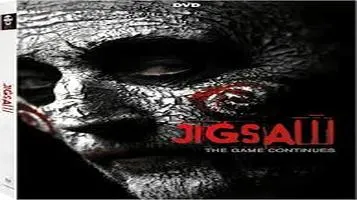Review of "Jigsaw" (2017)
Jigsaw is a technology incubator within Alphabet Inc., dedicated to addressing global security challenges through innovative technological solutions. Originally founded as Google Ideas in 2010, it was rebranded to Jigsaw in 2016. The organization's mission revolves around leveraging technology to tackle issues such as online censorship, disinformation, extremism, and cyberattacks. By developing and deploying cutting-edge tools, Jigsaw aims to protect digital freedom and enhance cybersecurity for vulnerable communities worldwide. Their projects include initiatives like Project Shield, which defends news organizations from DDoS attacks, and Perspective API, which helps identify toxic language in online conversations. Jigsaw collaborates with journalists, activists, and technologists to create a safer and more open internet, fostering resilience against digital threats.

"Jigsaw," directed by Michael Spierig and Peter Spierig, marks the return of the infamous "Saw" franchise after a seven-year hiatus, promising to reignite the terror that captivated audiences with its gruesome traps and moral dilemmas. As the eighth installment in the series, "Jigsaw" endeavors to breathe new life into a narrative that seemed to have reached its grizzly conclusion, while also appealing to both longtime fans and newcomers.
The premise of "Jigsaw" is built on a familiar foundation: a series of elaborate and deadly traps designed to test the morality and survival instincts of its victims. The movie opens with a high-speed chase culminating in the capture of Edgar Munsen (Josiah Black), who, under duress, triggers a game orchestrated by the infamous Jigsaw killer. This sets off a chain of events that parallels the gruesome discoveries of bodies bearing the unmistakable hallmarks of John Kramer (Tobin Bell), the original Jigsaw, who has been dead for over a decade. The question that looms over the narrative is whether Kramer has somehow returned from the grave or if a new apprentice has taken up his mantle.
The film's central narrative revolves around five new victims trapped in a barn, each forced to confront their past sins through a series of increasingly lethal tests. Parallel to this, a police investigation led by Detective Halloran (Callum Keith Rennie) and his team, including forensic pathologists Logan Nelson (Matt Passmore) and Eleanor Bonneville (Hannah Emily Anderson), attempts to unravel the mystery behind the new Jigsaw killings.
One of the strengths of "Jigsaw" lies in its ability to maintain the franchise's signature tension and suspense. The Spierig brothers manage to craft a visually engaging film, with the traps themselves being intricate and horrifyingly creative, a hallmark of the series. The production design deserves commendation for its atmospheric settings that evoke a sense of dread and claustrophobia, essential for a film that thrives on its ability to unsettle its audience.
Tobin Bell's presence, even in a limited capacity, is a significant asset to the film. His portrayal of John Kramer has always been the linchpin of the series, bringing a gravitas and philosophical depth to the character that elevates the "Saw" films beyond mere gore-fests. In "Jigsaw," his legacy looms large, and Bell's performance continues to imbue the character with a sinister charisma that is both chilling and captivating.
The new cast members deliver solid performances, with Matt Passmore standing out as Logan Nelson. Logan's character arc is compelling, providing an emotional anchor that grounds the narrative amidst the unfolding chaos. Hannah Emily Anderson's Eleanor Bonneville adds an intriguing layer with her morbid fascination with Jigsaw's work, blurring the lines between professional curiosity and obsessive admiration.
However, "Jigsaw" is not without its flaws. The film struggles with pacing at times, particularly in the investigative subplot, which occasionally feels like it drags in comparison to the high-stakes tension of the traps. The script, while serviceable, does not always provide the depth and complexity that the series' earlier installments managed to achieve. The moral quandaries and psychological insights that made the original "Saw" so compelling are somewhat diluted in "Jigsaw," with the focus shifting more towards the spectacle of the traps rather than the philosophical underpinnings.
Furthermore, the film's attempt to tie back into the larger "Saw" mythology is a double-edged sword. While it offers nostalgic nods for longtime fans, it can also be convoluted for those unfamiliar with the intricate web of the previous films. The twist ending, a staple of the "Saw" series, is clever but somewhat predictable for seasoned viewers, lacking the shock value that characterized the franchise's earlier revelations.
In terms of its contribution to the horror genre, "Jigsaw" succeeds in reaffirming the franchise's place as a pioneer of the torture-porn subgenre, while also attempting to evolve with the times. The Spierig brothers' direction brings a modern sensibility to the film, with slick cinematography and polished effects that contrast with the grittier aesthetic of the earlier movies.
Ultimately, "Jigsaw" serves as a competent revival of the "Saw" franchise, providing enough thrills and chills to satisfy hardcore fans while potentially attracting a new audience. It is a film that respects its legacy while striving to carve out its own identity within the horror landscape. Though it may not reach the heights of the original, it stands as a testament to the enduring appeal of Jigsaw's twisted games, reminding us that the legacy of John Kramer, much like his traps, is inescapable.
In conclusion, "Jigsaw" is a solid addition to the "Saw" saga, blending familiar elements with fresh twists. It may not reinvent the wheel, but it certainly ensures that the game is far from over.






